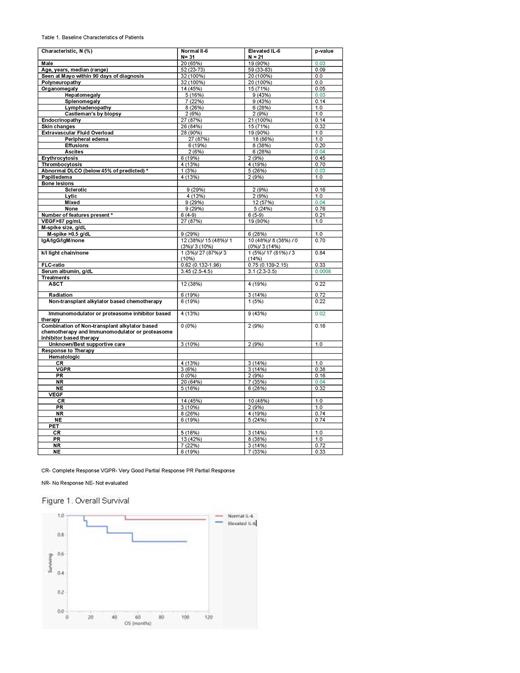Abstract
INTRODUCTION
POEMS syndrome is a paraneoplastic disorder that results in multi-organ disease, and Vascular endothelial growth factor (VEGF) is associated with disease activity. There is evidence that the cytokine Interleukin- 6 (IL-6) stimulates VEGF production in several cancer cell lines. It has also been suggested that patients with POEMS syndrome experience symptoms improvement when IL-6 levels are low. Our study aims to understand the role of IL-6 and whether it is a contributor to disease activity in POEMS syndrome.
METHODS
We conducted a retrospective study of patients (pts) seen at Mayo Clinic within 1 year of diagnosis for POEMS syndrome with an IL-6 level within 3 months of diagnosis between 01/01/2011-05/31/2021 were included. Our database comprised 358 pts,7 were excluded because did not have official diagnosis of POEMS syndrome. Two hundred and ninety-nine pts did not have IL-6 testing within 90 days of diagnosis and were excluded. Clinical data was abstracted from our electronic medical record. Descriptive statistics were used for IL-6 levels. The majority of IL-6 laboratory testing for pts utilized the same reference range. A minority of pts had alternate reference ranges; thus, all IL-6 values and reference ranges were fold-corrected to have a unified reference to determine elevation in IL-6. High IL-6 was considered any value above the normal range, also analyzed pts in quartiles and deciles. Hematologic, VEGF and PET response criteria were utilized to group pts into responders or non-responders. Time to progression (TTP) and overall survival (OS) was calculated using the Kaplan Meier method. Differences between curves were by log rank. Statistical analysis was conducted via JMP software package (SAS, Cary, NC, USA). Univariate analysis was done to determine the prognostic value of IL-6. Statistical significance is considered with p-values <0.05.
RESULTS
52 patients from among 352 met criteria and were included for analysis. Twenty-one patients (40%) had elevated IL-6 levels (IQR 5.67, 22.6) at the time of diagnosis. The fold elevation about normal was typically not very high, with a median of 3.1-fold elevation (IQR 1.3, 4.4; and range 1.0, 8.3). The percentage of males in the high IL-6 versus the normal Il-6 group were 90% versus 65%, p=0.03. Compared to normal IL-6, those with elevated IL-6 values had more instances of hepatomegaly (43% vs 16%, p=0.03), ascites (28% vs 6%, p=0 .04), abnormal DLCO (26% vs 3%, p=0.03), mixed bone lesions (57% vs 29%, p= 0.04), and lower serum albumin (range 2.3-3.5 vs 2.5-4.5 g/dL, p=0.0008).There was a trend for lower VEGF values among the high IL-6 group, but this did not meet statistical significance (median 250 vs 438 pg/mL).
There was no significant difference in the time to progression between pts with high versus normal IL-6 levels (HR 1.36; p=0.456). Overall survival was significantly longer in pts with normal IL-6 compared to pts with high IL-6 levels (Median OS 67.4 vs 47.8 months, p=0.02). Forty-two pts were evaluated for VEGF response after treatment; there was a significant improvement in time to progression (85.5 vs 14.9 months, p=0.03) in pts who were VEGF responders. Among pts evaluable for a hematologic response (n=15), time to progression in pts with baseline high IL6 was longer in hematologic responders compared to non-responders (p=0.02).
Conclusion
Although OS was longer for pts with normal IL-6, elevated IL-6 at the time of diagnosis does not prevent pts from achieving disease remission. The study demonstrates that response to treatment rather than interleukin-6 levels in pts with POEMS syndrome is more prognostic. This study is an important initial step into understanding the utility of IL-6 in POEMS syndrome.
Gertz: Akcea Therapeutics, Alnylam Pharmaceuticals Inc, Prothena: Consultancy; Aurora Biopharma: Other: Stock option; Ionis Pharmaceuticals: Other: Advisory Board; AbbVie Inc, Celgene Corporation: Other: Data Safetly & Monitoring; Akcea Therapeutics, Ambry Genetics, Amgen Inc, Celgene Corporation, Janssen Biotech Inc, Karyopharm Therapeutics, Pfizer Inc (to Institution), Sanofi Genzyme: Honoraria. Kumar: Oncopeptides: Consultancy; KITE: Consultancy, Membership on an entity's Board of Directors or advisory committees, Research Funding; Beigene: Consultancy; Merck: Research Funding; Antengene: Consultancy, Honoraria; Tenebio: Research Funding; Novartis: Research Funding; Roche-Genentech: Consultancy, Research Funding; Carsgen: Research Funding; Janssen: Consultancy, Membership on an entity's Board of Directors or advisory committees, Research Funding; Astra-Zeneca: Consultancy, Membership on an entity's Board of Directors or advisory committees, Research Funding; Bluebird Bio: Consultancy; Takeda: Consultancy, Membership on an entity's Board of Directors or advisory committees, Research Funding; Amgen: Consultancy, Research Funding; Abbvie: Consultancy, Membership on an entity's Board of Directors or advisory committees, Research Funding; BMS: Consultancy, Research Funding; Celgene: Membership on an entity's Board of Directors or advisory committees, Research Funding; Adaptive: Membership on an entity's Board of Directors or advisory committees, Research Funding; Sanofi: Research Funding. Dingli: GSK: Consultancy; Novartis: Research Funding; Janssen: Consultancy; Sanofi: Consultancy; Apellis: Consultancy; Alexion: Consultancy. Lin: Janssen: Consultancy, Research Funding; Merck: Research Funding; Novartis: Consultancy; Legend: Consultancy; Juno: Consultancy; Bluebird Bio: Consultancy, Research Funding; Celgene: Consultancy, Research Funding; Vineti: Consultancy; Kite, a Gilead Company: Consultancy, Research Funding; Sorrento: Consultancy; Gamida Cell: Consultancy; Takeda: Research Funding. Kapoor: Karyopharm: Consultancy; Cellectar: Consultancy; BeiGene: Consultancy; Pharmacyclics: Consultancy; Sanofi: Consultancy; Amgen: Research Funding; Ichnos Sciences: Research Funding; Regeneron Pharmaceuticals: Research Funding; Glaxo SmithKline: Research Funding; Karyopharm: Research Funding; Sanofi: Research Funding; Takeda: Research Funding; AbbVie: Research Funding. Dispenzieri: Pfizer: Research Funding; Sorrento Therapeutics: Consultancy; Oncopeptides: Consultancy; Alnylam: Research Funding; Takeda: Research Funding; Janssen: Consultancy, Research Funding.


